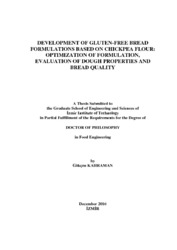Please use this identifier to cite or link to this item:
https://hdl.handle.net/11147/5738| Title: | Development of Gluten-Free Bread Formulations Based on Chickpea Flour: Optimization of Formulation, Evaluation of Dough Properties and Bread Quality | Other Titles: | Nohut Unu Bazlı Glutensiz Ekmek Formülasyonlarının Geliştirilmesi: Formülasyon Optimizasyonu, Hamur Özellikleri ve Ekmek Kalitesinin Değerlendirilmesi | Authors: | Kahraman, Gökçen | Advisors: | Harsa, Hayriye Şebnem Lucisano, Mara |
Keywords: | Gluten-free bread Chickpeas Roasted chickpea flour Dough |
Publisher: | 01. Izmir Institute of Technology | Source: | Kahraman, G. (2016). Development of gluten-free bread formulations based on chickpea flour: Optimization of formulation, evaluation of dough properties and bread quality. Unpublished doctoral dissertation, İzmir Institute of Technology, İzmir, Turkey | Abstract: | The main objective of this study was to develop chickpea flour-containing gluten-free bread formulations having improved physicochemical, nutritional and sensory properties. Increasing roasted chickpea flour (RCF) levels resulted in decreased cohesiveness and springiness, and darker color. Hardness and chewiness decreased and specific volume increased when water level increased. With increasing hydroxypropyl methylcellulose levels, softer crumb was obtained. Optimized formulation contained almost 25% RCF. Model validation revealed good agreement between predicted and measured responses. Based on the optimized formulation, roasted, raw or dehulled chickpea flour-containing rice flour blends, doughs and breads were prepared and analyzed. Compared to rice flour control, reduced retrogradation tendency was observed for chickpea flour-containing blends. Although gas retention capacities of chickpea flour-containing doughs were slightly lower than rice dough, 5-12% higher CO2 was produced. Chickpea flour addition increased both storage (G') and loss (G'') moduli. Bread containing RCF exhibited higher specific volume (2.89 mL/g), ~2.5 fold softer crumb and lower staling rate than raw and dehulled chickpea-containing formulations. Chickpea enrichment resulted with increased protein (24-36%), ash, fat and total phenolic contents; besides, reduced available starch levels (~14%). Breads fortified with dehulled and roasted chickpea flour were superior in terms of low rapidly digestible starch and high in vitro protein digestibility, respectively. Improved sensory quality was observed with an increased overall acceptability from 5.31 to 6.58-6.84. Addition of sourdough (30%) increased in vitro protein digestibility; however, slight decrease occurred in sensory attributes. Chickpea flour-enriched gluten-free rice bread resulted in improved quality characteristics depending on pretreatments applied to chickpea grain. Bu çalışmanın temel amacı gelişmiş fizikokimyasal, besinsel ve duyusal kalitede, nohut unları ile zenginleştirilmiş glutensiz ekmek formülasyonları geliştirmektir. Kavrulmuş nohut ununun artan seviyeleri iç yapışkanlık ve esneklik değerlerinde azalmaya ve renkte koyulaşmaya neden olmuştur. Formülasyondaki su seviyesi arttıkça sertlik ve çiğnenebilirlik değerlerinde düşüş, hacim değerinde artış gözlenmiştir. Hidroksipropil metilselüloz miktarındaki artış daha yumuşak ekmek içi oluşumuna neden olmuştur. Optimum formülasyonda yaklaşık %25 oranında kavrulmuş nohut unu bulunmaktadır. Model validasyonu sonucuna göre tahminlenen ve ölçülen yanıtların uyumlu olduğu görülmüştür. Optimum formülasyon dikkate alınarak kavrulmuş, kuru ve kabuğu ayrılmış nohut unu içeren pirinç temelli un karışımları, hamur ve ekmek örnekleri hazırlanmış ve analizlenmiştir. Nohut unu içeren un karışımlar sadece pirinç unu içeren kontrole göre daha az retrogradasyon eğilimine sahiptir. Nohut unlu hamurların gaz tutma kapasiteleri kontrole göre daha az olmakla beraber, %5-12 daha fazla CO2 üretim gerçekleşmiştir. Depolama (G') ve kayıp (G'') modülleri nohut unu ilavesiyle artmıştır. Kavrulmuş nohut unu içeren ekmek kuru ve kabuğu ayrılmış nohut unu içerenlere göre daha büyük özgül hacime (2.89 mL/g), yaklaşık 2.5 kat yumuşak ekmek içine ve düşük bayatlama oranına sahiptir. Nohut unu ilavesi protein (%24-36), kül, yağ ve toplam fenolik madde miktarında artış, kullanılabilir nişasta miktarlarında azalış (~%14) sağlamıştır. Kabuğu ayrılmış ve kavrulmuş nohut unu içeren ekmeklerde sırasıyla yavaş sindirilen nişasta miktarı ve in vitro protein sindirilebilirliği artmıştır. Duyusal kalite artmış, genel beğeni 5.31’den 6.58-6.84’e yükselmiştir. Ekşi maya ilavesi (%30) in vitro protein sindirilebilirliğini artırmış; bununla birlikte, duyusal kalitede azalmaya yol açmıştır. Glutensiz ekmeklerin kalitesinin nohuta uygulanan ön işlemlerden etkilendiği görülmüştür. |
Description: | Thesis (Doctoral)--Izmir Institute of Technology, Food Engineering, Izmir, 2016 Full text release delayed at author's request until 2020.01.30 Includes bibliographical references (leaves: 121-137) Text in English; Abstract: Turkish and English xviii, 141 leaves |
URI: | http://hdl.handle.net/11147/5738 |
| Appears in Collections: | Phd Degree / Doktora |
Files in This Item:
| File | Description | Size | Format | |
|---|---|---|---|---|
| T001554.pdf | DoctoralThesis | 3.74 MB | Adobe PDF |  View/Open |
CORE Recommender
Page view(s)
572
checked on Apr 28, 2025
Download(s)
602
checked on Apr 28, 2025
Google ScholarTM
Check
Items in GCRIS Repository are protected by copyright, with all rights reserved, unless otherwise indicated.